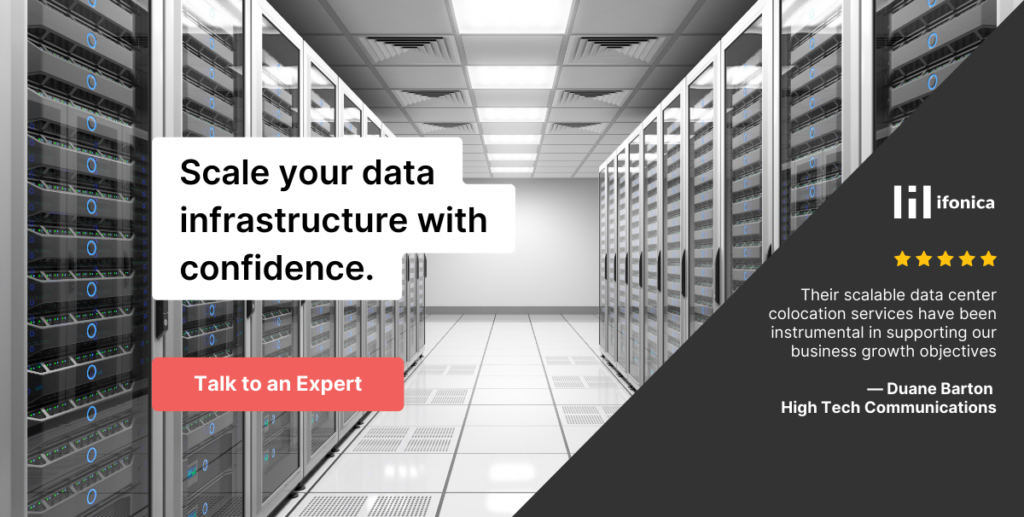The importance of a well-designed data center solution
As technology continues to advance, the role of data center solutions in empowering organizations will only become more significant. It’s imperative for businesses to stay informed about the latest trends and best practices in data center management to stay ahead in today’s competitive landscape. In this article we’ll dive into the essential features of a robust data center solution.
Infrastructure Optimization
Optimizing data center infrastructure is crucial for improving efficiency, reducing costs, and enhancing performance.
1) Location and Connectivity
A data center’s geographical location can impact latency and connectivity. Finding a facility with multiple carrier options with high-speed and redundant network connections should be a priority. The closer proximity to your customers will also reduce lag time and improve the connectivity experience.
2) Server Virtualization
This process involves creating multiple virtual servers on a single physical server, allowing better utilization of resources and faster provisioning of new services.
3) Scalability
A fundamental aspect of any data center solution revolves around scalability. As organizations grow, their data processing and storage needs also expand. A robust data center solution should be designed to accommodate this growth without compromising performance. Whether it’s through virtualization, cloud integration, or modular infrastructure, the ability to scale resources seamlessly is a hallmark of an effective data center solution.
4) Reliability
Downtime can be catastrophic for businesses, leading to lost revenue and damaged reputation. Therefore, redundant power supplies, backup systems, and failover mechanisms are essential components of a reliable data center solution. By minimizing the risk of service disruptions, organizations can maintain continuous operations and uphold customer satisfaction.
5) Improved Efficiency
Data center optimization tools maximize resource allocation, reduce energy consumption and lower operating costs. Server virtualization consolidates multiple virtual machines onto a single physical server, improving hardware utilization. Power management solutions optimize energy usage, cooling technologies reduce cooling costs and workload optimization algorithms ensure efficient resource use.

Security and Compliance
Ensuring that a data center solution follows strict security measures and compliance standards is non-negotiable. With the increasing frequency of cyber threats and stringent regulatory requirements, data security and privacy have become top priorities for organizations. Implementing robust security measures, access controls, and data encryption are imperative to safeguard sensitive information and maintain regulatory compliance.
6) Enhanced Security
Comprehensive security measures protect data and infrastructure. These include access controls, encryption, threat detection, and features to ensure compliance with regulations. Authentication mechanisms, encryption, and role-based access controls safeguard sensitive data. Threat detection systems continuously monitor for suspicious activity and alert administrators to potential breaches. These measures maintain trust with customers, partners, and stakeholders.
7) Automation for Streamlined Operations
Automation streamlines repetitive tasks like server provisioning, software updates, and patch management, reducing errors and freeing up IT staff. It also maintains consistency and standardization, minimizing configuration errors and improving overall reliability. Automating provisioning, monitoring, and management processes improves efficiency, reduces operational costs, and frees up IT resources for strategic initiatives.
8) Proactive Monitoring and Analysis
Real-time monitoring, performance analysis, and predictive analytics identify issues, optimize performance, and plan for future needs. Monitoring solutions provide visibility into infrastructure health, including servers, storage, networking, and applications. Analytics tools analyze historical data to identify trends, forecast resource requirements, and optimize allocation. Predictive analytics anticipate potential problems, enabling proactive management and mitigation strategies.
Business Continuity and Integration
Business continuity often involves the use of data centers to ensure that operations can continue during disruptions. Data centers house critical systems and store essential data, allowing businesses to recover quickly from incidents such as power outages, cyber-attacks, or natural disasters is a critical consideration for crisis management.
9) Disaster Recovery
Disaster recovery solutions ensure data protection and rapid recovery during disruptions. Regular backups of critical data and applications occur to secondary locations like remote data centers or cloud storage. Replication technologies keep data synchronized at secondary sites, minimizing data loss in case of a disaster. Recovery solutions enable rapid restoration of services and data, minimizing downtime and business disruption.
10) Seamless Integration
Data centers integrate with existing infrastructure components, including legacy systems, databases, and applications, without requiring significant modifications. This ensures operational continuity and enables data sharing and communication between different systems and platforms. Integration leverages investments in legacy systems, streamlines workflows, and enhances collaboration, improving efficiency and productivity.
11) Demonstrated Compliance
Data centers support adherence to legal and industry requirements. Compliance with regulations like HIPAA, GDPR, PCI-DSS, SOX, or FISMA is achieved through built-in security controls, audit trails, and reporting capabilities. These features help demonstrate compliance during regulatory audits or assessments.
A robust data center solution encompasses scalability, reliability, efficiency, and adherence to security and compliance standards. By carefully integrating these crucial components, organizations can establish a solid foundation to support their evolving IT needs and drive business growth.
If you’re interested in learning more about data center solutions, get in touch with one of our data center experts.